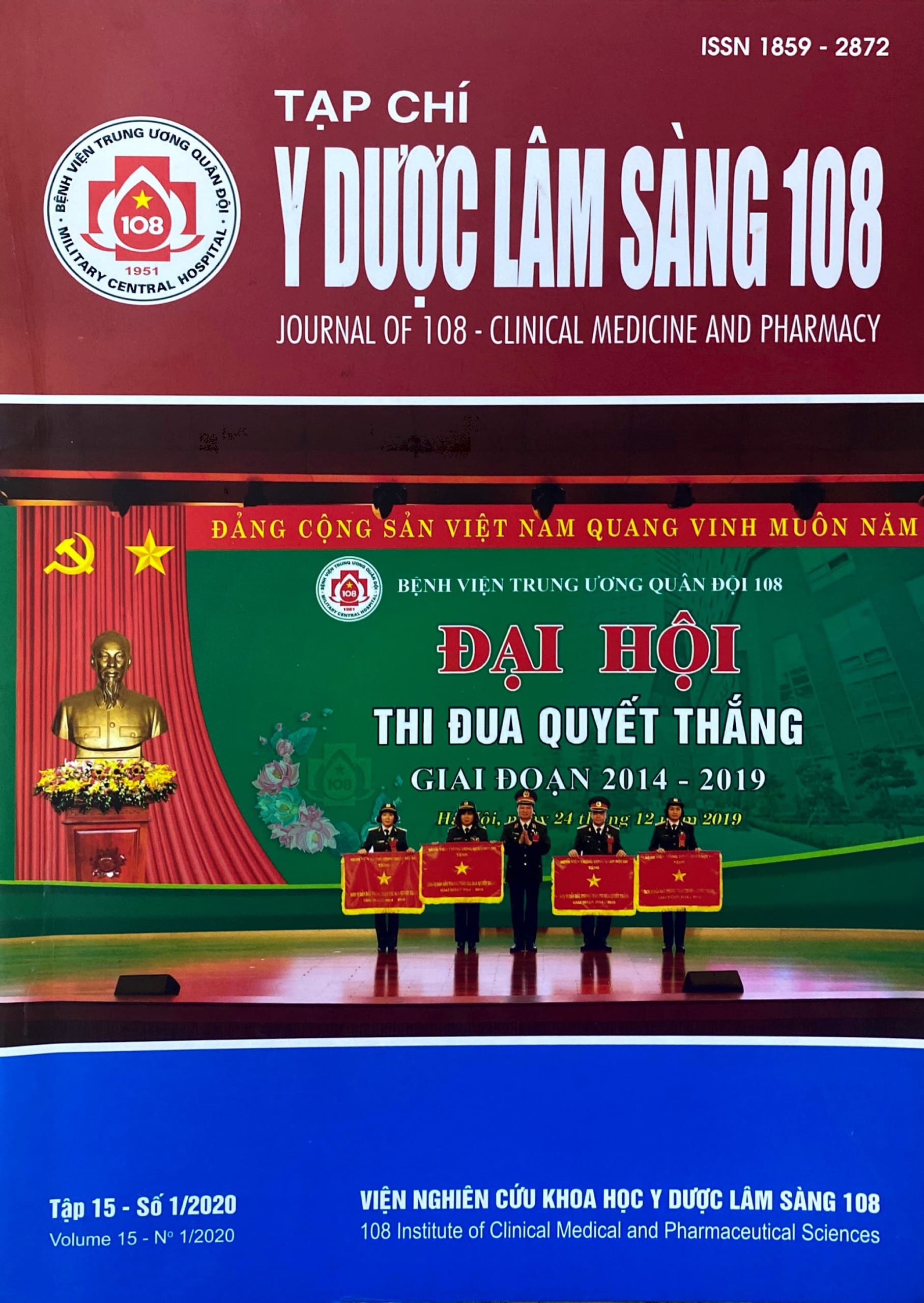Evaluating the results of laparoscopic total mesorectal excision after preoperative short-course radiation for rectal cancer
Main Article Content
Keywords
Abstract
Objective: To evaluate the results of laparoscopic total mesorectal excision after preoperative short-course radiation for rectal cancer. Subject and method: 70 patients stage II, III, mild and low rectal cancer were treated with short-course radiation combined with laparoscopic total mesorectal excision in 108 Military Central Hospital, from August 2015 to February 2019. The patients’ data were recorded: Patient’s characteristics, short-term and long-term results. Result: Low anterior resection surgery was 74.3%, Abdominoperineal resection surgery was 25.7%. Ileostomy rate was 53.8%. Intraoperative complication was 5.7%, serious postoperative complication was 12.1%. Mean operative time was 134.1 ± 32.4 minutes. Mean postoperative time was 10.7 ± 4.6 days. Complete and nearly complete mesorectum were 63.6% and 36.4% respectively. Mean distal resection margin was 24.5 ± 13.6mm. Distal margin with negative was 98.0%. Circumferential resection margin with negative was 98.5%. Overall survival and disease-free survival were 26.7 ± 9.6 months and 25.2 ± 10.9 months respectively. Recurrence rate was 12.1%. Late toxicity of the preoperative radiotherapy common grade 3 was 12.9%. Conclusion: Laparoscopic total mesorectal excision for mild and low rectal cancer were treated with preoperative short-course radiation is safety, effect and provided oncological radicality. Overall survival and disease-free survival were 26.7 ± 9.6 months and 25.2 ± 10.9 months respectively. Recurrence rate was 12.1%.
Article Details
References
2. Ngan SY, Burmeister B, Fisher RJ et al (2012) Randomized trial of short-course radiotherapy versus long-course chemoradiation comparing rates of local recurrence in patients with T3 rectal cancer: Trans-Tasman Radiation Oncology Group trial 01.04. J Clin Oncol Off J Am Soc Clin Oncol 30(31): 3827-3833.
3. Krajcovicova I, Boljesikova E, Sandorova M et al (2012) Preoperative radiotherapy of locally advanced rectal cancer: Clinical outcome of short-course and long-course treatment with or without concomitant chemotherapy. Klin Onkol Cas Ceske Slov Onkol Spolecnosti 25(5): 364-369.
4. Kang SB, Park JW, Jeong SY et al (2010) Open versus laparoscopic surgery for mid or low rectal cancer after neoadjuvant chemoradiotherapy (COREAN trial): Short-term outcomes of an open-label randomised controlled trial. Lancet Oncol 11(7): 637-645.
5. Minami H, Konishi T, Fukuoka H et al (2017) Safety of laparoscopic surgery after preoperative short course radiotherapy for lower rectal cancer. Gan To Kagaku Ryoho 44(12): 1506-1508.
6. Pas MH, Haglind E, Cuesta MA et al (2013) Laparoscopic versus open surgery for rectal cancer (COLOR II): Short-term outcomes of a randomised, phase 3 trial. Lancet Oncol 14(3): 210-218.
7. Fleshman J, Branda M, Sargent DJ et al (2015) Effect of laparoscopic-assisted resection vs open resection of stage II or III Rectal cancer on pathologic outcomes. JAMA 314(13): 1346-1355.
8. Stevenson ARL, Solomon MJ, Lumley JW et al (2015) Effect of laparoscopic-assisted resection vs open resection on pathological outcomes in rectal cancer: The ALaCaRT randomized clinical trial. JAMA 314(13): 1356-1363.
9. Bonjer HJ, Deijen CL, Abis GA et al (2015) A randomized trial of laparoscopic versus open surgery for rectal cancer. N Engl J Med 372(14): 1324-1332.
10. Jeong SY, Park JW, Nam BH et al (2014) Open versus laparoscopic surgery for mid-rectal or low-rectal cancer after neoadjuvant chemoradiotherapy (COREAN trial): Survival outcomes of an open-label, non-inferiority, randomised controlled trial. Lancet Oncol 15(7): 767-774.
 ISSN: 1859 - 2872
ISSN: 1859 - 2872
